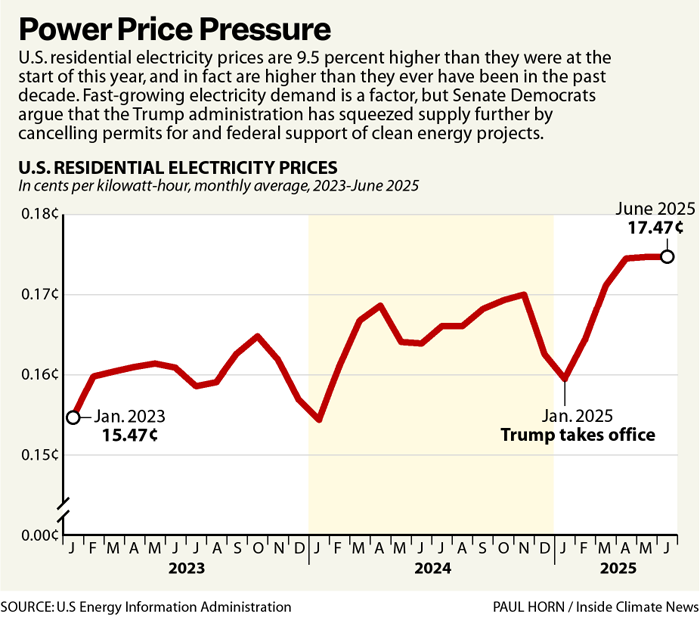Senate Democrats Blame Trump’s Assault on Clean Energy for High Electricity Prices
September 22, 2025
With U.S. households paying 10 percent more per kilowatt hour for electricity than they did at the start of this year, Senate Democrats sought Monday to tie the increasing pain for consumers to the Trump administration’s relentless rollback of clean energy policy.
“Trump and Republicans are doing what the American people hate most, and that is raise costs,” said Senate Minority Leader Chuck Schumer of New York in a conference call from Climate Week activities in his home state. “From skyrocketing electricity prices to ever-increasing homeowner insurance premiums because of climate change to healthcare.
“You may remember the biggest issue they had against Biden is raising costs,” Schumer said. “They’re making it much worse, and the American people are realizing it.”
Get Inside Clean Energy
Today’s Climate
Tuesdays
A once-a-week digest of the most pressing climate-related news, written by Kiley Price and released every Tuesday.
Get Today’s Climate
Breaking News
Don’t miss a beat. Get a daily email of our original, groundbreaking stories written by our national network of award-winning reporters.
Get Breaking News
ICN Sunday Morning
Go behind the scenes with executive editor Vernon Loeb and ICN reporters as they discuss one of the week’s top stories.
Get ICN Sunday Morning
Justice & Health
A digest of stories on the inequalities that worsen the impacts of climate change on vulnerable communities.
Get Justice & Health
Hawaii Sen. Brian Schatz, a leading Democrat on climate policy, said the increase in power prices—now occurring at twice the rate of inflation—can be traced to the administration’s decisions to stop clean energy projects and Congress’ repeal of federal support for renewable energy in the One Big Beautiful Bill Act, which it passed in July. Natural gas projects are backlogged because of supply chain issues and nuclear and geothermal power, which still get support under the new law, will take a long time to catch up with the increasing demand for electricity from data centers and artificial intelligence.
“Even if there were no planetary emergency, the most logical energy to put on the grid, because it is the cheapest and the fastest to get done, is wind and solar, with battery storage,” Schatz said. “We are going to keep talking about this, because the unfortunate thing is that this doubling of energy prices against the rate of inflation, we’re kind of at the bottom of this mountain. It has been spiking, but this is before the real spike in load comes.”
The senators’ remarks come as the Trump administration has been escalating its assaults on clean energy—issuing a series of stop-work orders for offshore wind projects and putting a stop to coal plant retirements. That’s on top of the instability that is rippling throughout the clean energy industry due to the impact of the repeal of federal subsidies in the One Big Beautiful Bill Act, which many experts predicted would increase costs. Trump’s tariffs on raw materials also have raised costs throughout the energy industry.
Electricity prices also increased during the Biden administration, due both to inflation and increasing energy demand, but they had fallen from their high point by the time Biden left office. Biden and the Democrats hoped that their signature clean energy policy, included in the 2022 Inflation Reduction Act, would help increase supply and make energy more affordable.

The Trump White House and the Department of Energy did not immediately respond to a request for comment on the remarks by Schumer and Schatz. But earlier this month, Jarred Agen, the executive director of Trump’s National Energy Dominance Council, defended the moves to eliminate federal support for renewables.
“I think it was given unfair preferential treatment in the past, particularly in the last administration,” Agen said in a conversation at the Center for Strategic and International Studies, a Washington, D.C. think tank. “What the president and I think the team at the White House is the most against is, obviously, just the American taxpayer covering the cost of the intermittent energy that is not producing what it has promised to produce and there is not the return of investment.
“It’s the tax subsidies that have really kept these afloat for a long time and basically the president is saying enough is enough,” Agen said.
But the cost of renewable energy has plummeted in recent years, which has allowed it to better compete against fossil fuel power—especially coal. Most analysts expect clean energy to continue to grow when the subsidies are phased out, just not quickly enough to meet the U.S. climate goals that were set under Biden.
And it’s not only consumers but workers who are feeling the pain of Trump policies, the Democrats said. They pointed to a new report by the advocacy group Climate Power that calculated that more than 80,000 jobs have already been lost or stalled in the sector this year; $42 billion in private investment has been lost or delayed.
“We were blindsided by the news that the project was being halted,” said Tom Kilday, an apprentice electrician on the Revolution Wind project off of Rhode Island that was hit with a Trump stop-order work. A member of the International Brotherhood of Electrical Workers, he joined the Democratic senators to describe how union workers were being affected.
“Thousands of workers like myself don’t know if we will still have a job in a week, or a month,” Kilday said. “And we’re a hard-working group of people … We’ve all taken hundreds, if not thousands, of hours of classes in our careers to develop our craft and expand our knowledge.”
Within a couple hours of the news conference, a federal judge in Washington, D.C., ordered a stay of the Trump order that allowed work to restart—at least for now—on Revolution Wind, which is 80 percent complete and was expected to be providing enough electricity for 350,000 homes in New England by next year.
Schumer said that because the Inflation Reduction Act spurred even more clean energy projects in Republican and purple states than in Democrat-led states, he believed the issue of what is happening in the industry can and should be addressed in negotiations he has called for with Trump and Republicans in order to head off a federal government shutdown. Congress must pass either a budget deal or a “continuing resolution,” or CR, by Sept. 30 to keep the current budget in place.
So far it is not clear such negotiations will take place. When asked if he believed that restoring support for clean energy could be included in a budget deal, Schatz said he felt it would take longer. “We’re like 10 days before the end of the federal fiscal year, so an energy provision in a CR is, I think, vanishingly unlikely,” he said. “But I do think there’s deal space over the next six months to alleviate the pain.”
About This Story
Perhaps you noticed: This story, like all the news we publish, is free to read. That’s because Inside Climate News is a 501c3 nonprofit organization. We do not charge a subscription fee, lock our news behind a paywall, or clutter our website with ads. We make our news on climate and the environment freely available to you and anyone who wants it.
That’s not all. We also share our news for free with scores of other media organizations around the country. Many of them can’t afford to do environmental journalism of their own. We’ve built bureaus from coast to coast to report local stories, collaborate with local newsrooms and co-publish articles so that this vital work is shared as widely as possible.
Two of us launched ICN in 2007. Six years later we earned a Pulitzer Prize for National Reporting, and now we run the oldest and largest dedicated climate newsroom in the nation. We tell the story in all its complexity. We hold polluters accountable. We expose environmental injustice. We debunk misinformation. We scrutinize solutions and inspire action.
Donations from readers like you fund every aspect of what we do. If you don’t already, will you support our ongoing work, our reporting on the biggest crisis facing our planet, and help us reach even more readers in more places?
Please take a moment to make a tax-deductible donation. Every one of them makes a difference.
Thank you,
Search
RECENT PRESS RELEASES
Related Post



